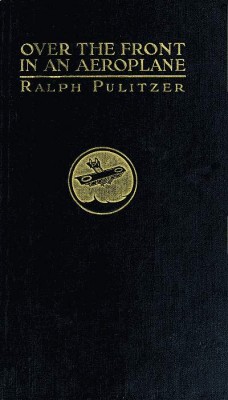The earth had become a strange and placid panorama

Over the Front in an Aeroplane
and scenes inside the French and Flemish Trenches
by Ralph Pulitzer
I spotted this piece of journalism when I was browsing Project Gutenberg for books to add to my Kindle. I’m not a big fan of novels about fighting wars but for some reason wartime journalism interests me. (It might be because for a while in my youth I aspired to be Kate Adie.) As far as I can tell this book is sadly now largely forgotten and I’m sure there are better accounts out there of the First World War, but I liked this and thought Pulitzer did a good job of describing the war to the folks back home in the US.
“‘So far,’ an English staff-officer remarked to me, ‘we English have been bungling amateurs in the art of war contending against trained professional specialists. But with a couple of years’ more experience I believe we shall know as much about it as they do, and then we shall win.'”
This Pulitzer, by the way, was the son of Joseph Pulitzer, the newspaper magnate who bequeathed money to Columbia University that became the Pulitzer Prizes. In 1911 Joseph died, making Ralph the head of a major news corporation aged just 32. Which perhaps explains why in this book Pulitzer is not treated just as any other journalist. In fact, he devotes a whole chapter to the average journalistic experience of the frontline, which he makes sound quite cosy, if also frustrating (good food and hotels, not much access to the action).
“With a snap and a roar the battle plane started slowly forward, gained in speed till we were running along the big field like a racing automobile, then suddenly the people standing around dropped away from us as if on a gigantic express elevator leaving one standing on the upper floor of a skyscraper, and in a moment more the earth had become a strange and placid panorama with which we had no connection or concern.”
Pulitzer spent a month – August 1915 – in France and Belgium visiting various sites on or near the frontline. The book is structured in a slightly odd way that feels as though it may have been a series of columns before it was a book, or perhaps that was just his ingrained writing style. Each chapter details an experience of some kind, from the first and title chapter of flying over the frontline near Paris, to a grenade-throwing lesson, to a comparison of the French and Belgian trenches.
Each experience necessarily begins with making nice to the relevant generals and in early chapters the many levels of command to be met and receive hospitality from is detailed perhaps a little more than necessary, but it certainly gets the point across that no journalist, even Pulitzer with his extra special access, can truly claim to have experienced the frontline like any soldier. There are descriptions of meals that had me salivating, including plenty of wine, champagne and brandy.
“The officers of all the armies feel that it is infinitely more important to prove to you that they can give you a good cup of coffee and a good cigar than it is to show you the most beautiful battle that was ever fought.”
It was genuinely fascinating to read an account from so early in the war that was nevertheless aware that this fight would continue for a few more years, from an American whose country was not involved in the war but knew it almost certainly would become involved. Pulitzer shows boyish excitement about technological advances in weaponry (i.e. fancy new guns) but also talks about the human cost of war, both in lives lost and in homes/villages/ways of life lost.
“One must realise that [the Belgians] are practically an army without a country. One must understand that when they get furloughs they cannot spend them with their families in their homes, getting comfort and encouragement. They either stay within sound of the firing or spend a bleak six days among the strangers of England or of Northern France.”
Published 1915 by A L Burt.
Source: Project Gutenberg.